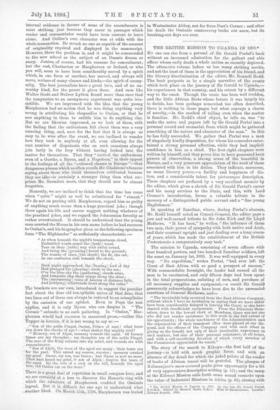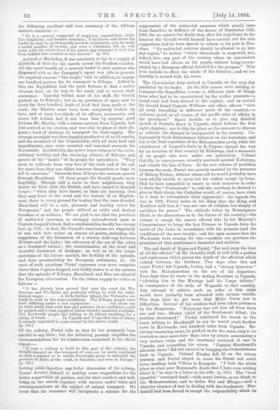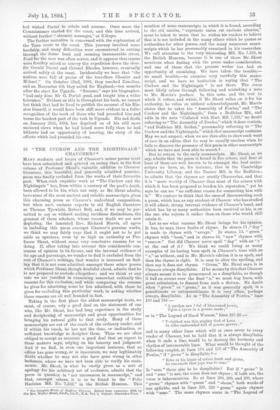THE BRITISH MISSION TO UGANDA IN 1895.* No one can
rise from a perusal of Sir Gerald Portal's book without an increased admiration for the gallant and able officer whose early death a whole nation so recently deplored. The attractive volume before us has many striking merits,.
and not the least of these is the appreciation of his friend, and the literary discrimination of the editor, Mr. Remaell Rodd.
The book purports to be a simple narrative of the events which took place on the journey of Sir Gerald to Uganda,— his experiences in that country, and his return by a different way to the coast. Though the route has been well trodden, and the little African State whose future it was largely his to decide, has been perhaps somewhat too often described, there is nothing in these pages but what conveys a charm of novelty,—in the method of telling even when the matter is familiar. Mr. Road's chief object, he tells us, was "to make the notes and papers left by Sir Gerald Portal into a. personal record and memorial, from which might be gathered something of the nature and character of the man." In this he has fully succeeded. We gather that Portal was a man of singularly kindly disposition, for whom his comrades enter- tained a strong personal affection, while they had implicit confidence in him as a chief. The first eight chapters were written by himself, and they prove him to have possessed keen powers of observation, a strong sense of the beautiful in Nature, and a very generous appreciation of the work of those associated with him in his duties. They indicate, moreover,.
no mean literary power,—a facility and happiness of . dic- tion, and a considerable talent for picturesque description. These chapters are prefaced by a very excellent memoir by the editor, which gives a sketch of Sir Gerald Portal's career and his many services to the State, and this, with Lord Cromer's introduction, forms a valuable tribute to the memory of a distinguished public servant and a "fine young Englishman."
In speaking of Zanzibar, where, during Portal's absence, Mr. Rodd himself acted as Consul-General, the editor pays a just and well-earned tribute to Sir John Kirk and Sir Lloyd Mathews. "It has been," he writes, "the influence of these two men, their power of sympathy with both native and Arab, and their constant upright and just dealing over a long course of years, which has made the establishment of the British Protectorate a comparatively easy task." • The mission to Uganda, consisting of seven officers with four hundred porters, and two hundred Zanzibar soldiers, left the coast on January 1st, 1893. It was well equipped in every way. "No expedition," writes Portal, "had ever left the Coast of East Africa with so good a prospect of success." With commendable foresight, the leader had caused all the men to be vaccinated, and only fifteen days had been spent in the total preparations, enlisting of men, and purchase of all necessary supplies and equipment,—a result Sir Gerald generously acknowledges to have been, due to the unwearied exertions of General Mathews, and- " The invaluable help received from the East African Company, without which I have no hesitation in saying that we must either have been considerably delayed in leaving the Coast, or else have started with insufficient equipments. From the Directors them- selves, down to the lowest clerk at Mombasa, there was not one who did not render assistance in this work to the full extent of his opportunity; the whole machinery of the Administration and the organisation of their transport office were placed at our dis- posal, and the officers of the Company vied with each other in giving us the benefit not only of their invaluable experience in such matters, but also of their personal assistance, at all hours, and with a self-sacrificing devotion of which every member of the Commission appreciated its result."
The story of the march to Kikuyu—the first half of the journey—is told with much graphic force, and with an absence of dry detail for which the jaded palate of the reader of books of African travel will be grateful. The glimpse of Kilimanjaro's snow-covered peaks gives opportunity for a bit of very appreciative descriptive writing (p. 5); and the camp at the Kibwezi Mission calls forth some sound remarks upon the value of Industrial Missions in Africa (p. 61), closing with * Tho Brava Misaion to Uganda in 1893. By the late Sir Gerald Portal, .0.711.G. Edited by Ronnell Budd, C.M.G. With 40 Elnetratione. London:. Edward Arnold, 1854.
the following excellent and true summary of the African native's character :— "He is a curious compound of suspicion, superstition, child- like simplicity, and brutish obstinacy ; if he knows and trusts his leader he may be guided gently towards civilisation, may be made a useful member of society, and even a Christian, but he will resist with the whole force of his nature any attempts to kick him from behind into comfort or into heaven." (p. 62.)
Arrived at Machakos, it was necessary to lay in a supply of 23,000 lb. of flour for the march across the foodless country. All the usual trouble of a caravan leader in such matters was dispensed with as the Company's agent was able to procure the required amount "like magic," and, in addition, to engage one hundred porters for its transport to Kikuyu. Added to this, the Expedition had the good fortune to find a native caravan here, on its way to the coast, and to secure their assistance. Leaving behind most of his staff, Sir Gerald pushed on to Kikuyu ; but as no provision of spare men to carry the four hundred loads of food had been made at the coast, the Mission must have been completely broken up here, and at least two-thirds of its officers, necessaries, and stores left behind, had it not been that by singular good fortune Mr. Martin, with a return caravan from Uganda, had just arrived at the station, and was able to place at their dis- posal a herd of donkeys to transport the food supply. The strange oversight was thus happily productive of no ill-results, and the members of the Commission, with all their food and impedimenta, once more reunited and marched onwards for Kavirondo. Incidentally, the writer bears witness to the extra- ordinary fertility and the charming climate of Kikuyu, and speaks of the "mania" of its people for agriculture. "They seem to cultivate from very love of the work and of the soil far more than they can either consume themselves or hope to sell to caravans." Onwards from Kikuyu the caravan passed through Masailand. Of these people Sir Gerald speaks most hopefully. Though still a curse to their neighbours, they desire no feud with the British, and have ceased to demand Aongo ; "when they have learnt, as they are learning, that they may trust to the word and the honour of an English- man, there is every ground for hoping that the once dreaded Masailand will be a safe, pleasant, and healthy resort for Europeans," and the people utilised as cattle and donkey 'breeders or as soldiers. We are glad to see that the practices of native-led caravans, so strongly animadverted upon in Captain Lugard's book, find a condemnation hardly less strong here (p. 113) ; in fact, Sir Gerald's conclusions are singularly at one with that writer on almost all points, including the suggestion of the formation of a station half-way between Kikuyu and the Lake ; his advocacy of the use of the zebra as a transport animal ; the condemnation of the cruel and wasteful treatment of donkeys ; as well as in the larger questions of the labour market, the fertility of the uplands, and their practicability for European settlement, &c. On most of such questions Portal expresses even more sanguine views than Captain Lugard, and boldly states it as his opinion that the uplands of Kikuyu, Masailand, and Mau are adapted for European colonisation. On the labour supply he writes as follows :—
" It has already been proved that near the coast the Wa- Duruma and Wa-Nyika are perfectly willing to work for infini-
tesimal wages A little further inland, the Wakamba are ready to work on the same conditions, The Kikuyu people have
been suffering under a bad reputation ; but there can be little doubt that with tact and patience their confidence could be gained, and a vast supply of labour thereby rendered available. The Kavirondo people are willing to do almost anything for a string of beads In Uganda and Usogo this sort of labour
is already organised to some extent by the native chiefs 33
(p. 166.) Of the railway, Portal tells us that he has purposely been 'careful to say little; but the following passage amplifies the recommendations for its construction contained in his official report :—
"If ever a railway is built to this part of the country, the freight charged on the transport of corn can be easily regulated in such a manner as to enable Kavirondo grain to undersell the produce of India at the coast, in Zanzibar, and even in Europe." (p. 126.) Setting aside therefore any fuller discussion of the railway, Portal devotes himself to making some suggestions for the better supervision of porters, and for their comfort and well- being on the march, together with various useful hints and recommendations on the subject of animal transport. We trust that his successor will inaugurate a scheme for the
suppression of the native-led caravans which yearly issue from Zanzibar, in defiance of the decree of September 11th, 1890, for we cannot but doubt that after hie experience in the Interior Sir Gerald would himself have carried out his own suggestions had he been spared to return to his post in Zan- zibar. "No native-led caravan should be allowed to go into any region," he writes, "where slave-trade is suspected, nor, indeed, into any part of the country where its misconduct would have bad effects on the people, without being accom- panied by a European official detailed for the purpose." This is to include in effect the whole of the Interior ; and we are heartily in accord with his views.
The Commission duly arrived in Uganda, on the very day predicted by its leader. At the Nile canoes were waiting to transport the Expedition across--a different state of things from what had to be encountered by the earlier pioneers—a broad road bad been cleared to the capital; and on arrival Sir Gerald found Captain Williams and other officers "were all away travelling in different parts of the country,—a welcome proof, at all events, of the pacific state of affairs in the provinces." Space forbids us to give any detailed sketch of Portal's diary in Uganda, which follows the first eight chapters ; nor is this the place or the moment to discuss or criticise the changes he inaugurated in the country. Un- fortunately fresh disturbances followed on his departure, and led to the final expulsion of the Mahommedan party, while the withdrawal of Lugard's forts in ,S. Unyoro opened the way for an invasion of that country by Kabarega, and a massacre of its people who were under our protection. Colonel Colville, in consequence, recently marched against Kabarega, and rebuilt the line of forts. In the new scheme of partition between the sects, Portal was greatly assisted by the presence of Bishop Tucker, without whose aid he would probably have been wholly unable to carry out his wishes except by force. Had he been compelled to resort to such measures in order to force the " Protestants " to cede the territory he desired to give to their rivals, the Catholics would, of course, have risen to a man to exterminate their opponents As regards the war in 1892, Portal notes in his diary that the King and Katikiro said that it "was not one of religion, but simply of ambition for power." The attitude taken by Monseigneur Hirth in the discussions as to the future of the country,—his refusal to accept the canoes offered him by her Majesty's Commissioner to bring the boy Princes to Uganda from the south of the Lako in accordance with his promise (and the conditions of the new treaty) ; and his open menace that the Wa-fransa were arming for war,--confirm our previous im- pressions of that gentleman's character and motives.
The sad death of Raymond Portal, "far and away the best of all the officers" of Sir Gerald's staff, is told with a pathos and tenderness which proves the depth of the affection which existed between the brothers. Two days after this sad event Portal left Uganda, having had a stormy interview" with the Mahommedans on the eve of his departure. Pour days later he wrote to the Acting Resident in Uganda, "advising him to fine Mwanga half his Usoga tribute," in consequence of the raids of Waganda in that country. Any attempt to enforce such an order at this crisis would have probably been attended with serious results. Five days later he got news that Major Owen was in difficulties. Several of his soldiers had been taken prisoners by the Manyuema. "Kabarega has out him off from forts one and- two ; Shukri (chief of the Soudatiese) killed ; his position threatened." Portal continued his march to the coast, writing to Macdonald to say he would await further news in Kavirondo, two hundred miles from Uganda. Re- ceiving reassuring news, be pushed on for the coast, only to be overtaken once more four days later by letters announcing a very serious crisis and the imminent outbreak of war in Uganda, and requesting his return. "Captain Macdonald's alarmist views" did not succeed in bringing the Commissioner back to Uganda. Colonel Rhodes fell ill on the return journey, and Portal stayed to nurse his friend and await news, sending back Villiers to Kampala. I hate the whole place so since poor Raymond's death that I hate even writing about it," he says in a letter to his wife. (p. 250.) The "local squabble" arranged itself ,—with scant justice, as we think, to the Mohammedans, and to Selim Bey and Mbogo,—and a singular absence of tact in dealing with the Sondanese. Mac- donald had been forced to accept the responsibility which he bad wished Portal to retain and assume. Once more the Commissioner started for the coast, and this time arrived, without further "alarmist messages," at Kikuyu.
The further narrative is concerned with the exploration of the Tana route to the coast. This journey involved some hardship, and many difficulties were encountered in cutting through the dense bush and crossing innumerable rivers. Food for the men was often scarce, and it appears that canoes were forcibly seized to convey the expedition down the river. Sir Gerald Portal and Colonel Rhodes, however, eventually arrived safely at the coast, Incidentally we hear that "the natives were full of praise of the travellers Chanler and Hanel." On October 22nd, 1893, they reached Zanzibar, and on November 4th they sailed for England,—ten months after the start for Uganda. "Success," says his biographer, "had only done Sir G. Portal good, and taught him a wider tolerance." Evident as this is throughout his book, we cannot but think that had he lived to publish the account of his Mis- sion himself, it would have been still more evident in a fuller recognition of the work of those who had preceded him and borne the hardest part of the task in Uganda. His sad death on January 26th, 1894, has deprived us of his still more matured views when be had heard more fully than he had hitherto had an opportunity of hearing, the story of the efforts which had preceded his own.




































 Previous page
Previous page